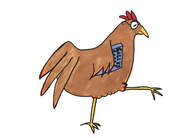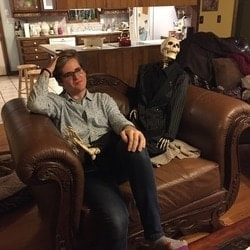Sacred Chickens
Menu
SACRED CHICKENS
 Today Jarad is sharing his thoughts on the literary canon. Let us know your thoughts as well! I went through a phase in 8th or 9th grade, where it was my mission to read all the “classic” books, something I later came to know as the literary canon. I got through quite a few- Charles Dickens, Alexandre Dumas, Salinger, Harper Lee, Mark Twain, I read them all. Was this a good or bad thing for me to do? I enjoyed some of them. I learned something. I was free to read other things while my classmates slogged through their assignments, at least when one of the ones I’d read showed up on the syllabus. But sometimes now I question why I did it. Those authors and books are held in a different place, on a pedestal of sorts. But here’s the thing: while there are many authors whose work I enjoyed, there are an equal number that I didn’t like. That’s not to say they aren’t good writing. Different things work for different people, but there were plenty of them I got next to nothing out of. Some I found terribly boring. (Julie confesses to never having read more than five pages of Moby Dick. And she tried to read her way through As I Lay Dying but even snark couldn’t propel her to the finish line). These great works of literature, these paragons of the English language did not live up to the hype; in fact (sorry Herman Melville) I wouldn’t have given some of them any kind of awards, much less putting them on a list of books that everyone must read to be accepted as properly educated. I’ve always wondered what the qualifiers were for a book or an author to be put into the canon (or really, what the, “canon,” really was. It’s quite nebulous). Is it that the books are necessarily good, or do they just have to make an impact? Are modern authors added to the canon or is it just old white guys? Why are other people telling me what the best writing is- can’t we decide for ourselves? What seems most telling is that the canon is different depending on who you ask; there is no universally agreed upon list of the world’s greatest literature. This is interesting because the canon supposedly frames how we teach literature. Its upheld as the standard. There is a sense that the works in the, “canon,” are the best of the best, and everything else is mediocre, which explains why nothing modern has been deemed worthy so far. This leads me to yet another question: how much time has to pass before works of literature are admitted into the canon? And why is it that we look back on the books that were arguably considered normal, if exceptional, in their time, and extraordinary in ours? Is it simply that writing patterns and verbiage distinguish them from modern novels? There’s a level of condescension there, and a sense that modern authors somehow aren’t writing influential, moving and groundbreaking literature. I don’t agree with that sort of thinking, but I have plenty of professors who do. There’s another problem with this hierarchy of literature for me, diversity in the canon. I want to see more women, more people of color, more LGBTQ authors, not to fill some diversity quota, but because if the canon is our standard and what we base teaching off of, having people in there who bring different sets of experiences, who see the world in different ways, is important and valuable, especially when you’re talking about education and representation. It is my firm belief that exposing children to different kinds of people early on is the best way to fight homophobia, racism, and all kinds of prejudice. I was reading an article recently when thinking about this post, and it said that putting modern authors in the canon often, “lowered the standard of literary excellence” and that it will, “dilute the collective literary knowledge.” This seems to be the common thought surrounding this issue, but for me, this language sets off some alarm bells. Specifically, when you’re talking about diluting and lowering our standards of “excellence”, it reminds me of how certain people talk about immigrants and the continuing diversification of our population. There’s a parallel in thinking there; that when we include non-white people, or gay people, or too many women, somehow our standards are lowered. Diversity is a strength, not a weakness, and white men are not the only people capable of producing works of literary excellence. Now, many people know this, but it’s important to consider what the real motivations are behind those kinds of statements, because in my experience, I’ve heard it quite a lot. What is the goal for the people who get to decide? Because that’s really what they’re talking about. Are they then trying to preserve a monopoly on the canon, or indeed on, “literary excellence?” More than that who are the people who get to decide? From whence springs their authority? So, on the canon I have mixed feelings. I feel that we cannot completely discount what is already there, there are some brilliant writer who deserve the credit, but I also feel that there is an opportunity to enrich it far beyond what it is now. What do you guys think?  Bio Jarad is the co-administrator and writer for Sacred Chickens, attends college at MTSU, loves tea and coffee, and tries to spend every spare second reading. He recently developed an interest (some might say obsession) with gardening. Jarad is an English major with a concentration in literature. Bless his heart! Let's all light a candle for him and send him happy thoughts!
0 Comments
Leave a Reply. |

Click Photo above to buy ebook or paperback from Amazon.
Here's the link to Barnes and Noble Or order through your favorite independent bookstore! Categories
All
|
 RSS Feed
RSS Feed